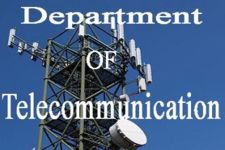DoT leads thematic session on India's telecom innovation
Published: Nov 06, 2025

By TIOLCorplaws News Service
NEW DELHI, NOV 06, 2025: THE Department of Telecommunications (DoT) participated in the Emerging Science, Technology and Innovation Conclave (ESTIC) 2025 being held at Bharat Mandapam, New Delhi, from November 03-05, 2025. As one of the key organisers, DoT led the thematic session on 'Digital Communication' on November 05, 2025. The session was chaired by Dr. Neeraj Mittal, Secretary (Telecom) and Chairman, Digital Communications Commission, and featured participation from leading academicians, scientists, and industry leaders from across India's telecom and digital innovation ecosystem. The session was also attended by Ashok Kumar, Deputy Director General, Department of Telecommunications, and Vice Chair, IEG, WTPF, ITU.
In his inaugural address, Dr. Neeraj Mittal said that "Telecom has become an enabler not only of the economy but of all technologies which are developing in various disciplines." Highlighting the transformative power of connectivity and the rapid evolution of artificial intelligence, he noted that "the sector heralds a new opportunity for all of us to achieve the impossible."
Dr. Mittal underscored that connectivity is the bedrock of all productive activity and that India's telecom revolution has a direct bearing on national economic growth. He stated that India has achieved one of the fastest 5G rollouts globally, guided by the vision of the Hon'ble Prime Minister, and that 100 5G labs have been established across the country to develop use cases and prepare the nation for leadership in 6G technologies.
The Secretary (Telecom) highlighted that the Government's approach to next-generation communication is multi-pronged, supporting research and development, encouraging domestic manufacturing, and building strong bridges between academia, industry, and government. He informed that over 100 R&D projects dedicated to 6G are currently being supported, with a focus on advancing Open RAN, indigenous chipsets, AI-based intelligent networks, and regulatory sandboxes to foster innovation.
Dr. Mittal also spoke about the Bharat 6G Alliance, a pioneering initiative driven by the vision of the Prime Minister, which has already signed 10 international collaborations with global 6G bodies and aims for India to contribute 10% of worldwide 6G patents by 2030.
The keynote address on "How to Realise the 6G Vision for Bharat" was delivered by Prof. Kiran Kumar Kuchi, Department of Electrical Engineering, IIT Hyderabad, and Founder, WiSig Networks. The session also included talks by Ramu Srinivasaiah, Founder & Director, Lekha Wireless Solutions, Bengaluru, on "Private Networks Reimagined: ORAN's Expanding Role in 6G Network Design", and Dr. Kumar N. Sivarajan, Co-Founder & CTO, Tejas Networks, Bengaluru, on "Making India a Global Telecom Sector Leader by 2030."
A panel discussion on "Taking Indigenous Technologies to the Next Level" was moderated by Dr. Rajkumar Upadhyay, CEO, C-DOT, with participation from Prof. Radhakrishna Ganti, Department of Electrical Engineering, IIT Madras, Chennai; Prof. Panganamala Vijay Kumar, Department of ECE, IISc Bengaluru; A. Robert Jerard Ravi, Chairman & Managing Director, BSNL, New Delhi; and Dr. Parag Naik, Lead Scientist and Executive Vice President, Tejas Networks, and former CEO, Saankhya Labs.
The panel explored extending the 5G ecosystem in India, advancing indigenous PNT through the NavIC L1 signal, and building disruptive technology stacks from D2M to 6G.
ESTIC 2025 on the theme 'Viksit Bharat 2047 - Pioneering Sustainable Innovation, Technological Advancement, and Empowerment', was inaugurated by Prime Minister Narendra Modi on November 03, 2025. It is jointly organised by 13 Ministries and Departments of the Government of India under the guidance of the Principal Scientific Adviser to the Government of India. It brought together over 3,000 participants from academia, research institutions, industry and government, along with nobel laureates, eminent scientists, innovators and policymakers. Deliberations focus on 11 key areas, including Advanced Materials & Manufacturing, Artificial Intelligence, Bio-Manufacturing, Blue Economy, Digital Communications, Electronics & Semiconductor Manufacturing, Emerging Agriculture Technologies, Energy, Environment & Climate, Health & Medical Technologies, Quantum Science & Technology, and Space Technologies.




